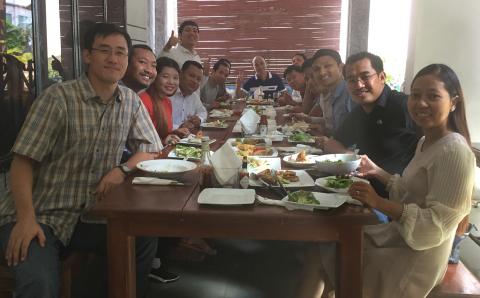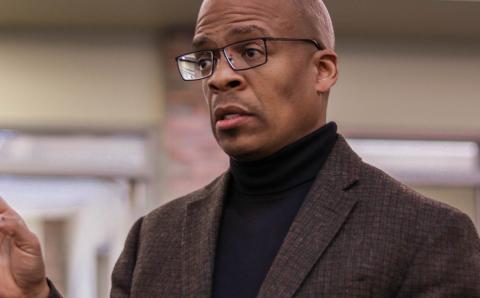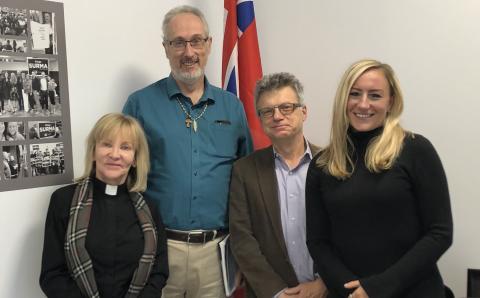How can we keep listening to the litany of woes in our world without becoming numb? What can ordinary Christians in North America do about the continuing multitudes seeking refuge from desperate lives in their home countries only to find increasing limits to their welcome here and elsewhere?
It may be easy to shut our eyes and hearts to nameless throngs, but personal relationships make it much harder. That’s been the experience in our church. Eastern Avenue Christian Reformed Church is an older established congregation in the city of Grand Rapids, Mich. Ten years ago, responding to changes in our community, we began working toward a bilingual English/Spanish service. Today, a much more diverse congregation gathers for worship in two morning services. Now we know the names and faces of people with stories we cannot choose to ignore. These are our brothers and sisters in Christ, and when one member of our body suffers, we all suffer.
Last year, late on Ash Wednesday night—March 1, 2017—a call for help went out from one of our members from Guatemala. Her niece Yésica had just gotten the news that she would be deported by U.S. Immigration and Customs Enforcement (ICE) three weeks earlier than had previously been scheduled. Suddenly she had only two days to get ready. She had already come to the difficult decision to take her two boys, ages 4 and 8 months, with her, after agonizing about the possibility of leaving them with other family members.
But now Yésica needed help, and quickly. She was refused the medical records of her children, so one of our members, a physician, got her those records the next day. She also needed someone to drive her and the two children early Friday morning to the Detroit airport. I offered to drive, and Wendy, one of our members from the Dominican Republic, offered to accompany us. Wendy’s presence was of great comfort to Yésica—and to me—as she prayed in both Spanish and English on the way, reminding her of God’s love and promises to be her refuge in times of trouble.
As we stepped out of the elevator at the Detroit airport, a Homeland Security officer was waiting for us; he knew exactly where Yésica was because of the ankle tether we hadn’t realized she was wearing. The area was filled with anxious families ready to fill the plane headed that morning for Guatemala City. We offered her snacks and also some cash from others in our church, but she refused the cash—we later learned it simply isn’t safe for a young woman to carry cash; wiring funds is better. We prayed together, and Yésica and her children headed to security. Throughout all of this, including the ride, the boys were so quiet. We learned the next day from her aunt that when they landed, the younger boy had such a high fever that they spent their first night back in Guatemala in the hospital.
It was a quiet ride home. Wendy and I grieved at this young woman and two young boys returning to such an uncertain future without their husband, father, and extended family. How would she manage and also take care of her children? She had entered the country illegally and had been caught by the authorities. But now this young woman, who had come because of circumstances we did not know, had a name and a face.
The next day, Saturday morning, our church hosted a workshop called “Church Between Borders: A Guide to Welcoming the Stranger.” I was tired, but wanted to be there. More than 50 people from our church attended, mostly from our English service, hoping to better understand what many from our church and community were going through. The denomination’s Office of Social Justice had prepared the materials, and the three hours flew. We had no idea how complex and lengthy the process is for legal immigration, how few actually make it, and how many fewer now have a chance to come through our immigration or asylum system than in past years.
The morning ended with testimonies. Yésica’s aunt described her life growing up in Guatemala—the kind of life her niece was likely returning to. A young man in the Deferred Action for Childhood Arrivals program (DACA) spoke up; he had never spoken before in front of a group. His voice breaking, he spoke of coming to the United States as a young boy and now working legally (“It’s so much better!”), grateful that his employer offered tuition support for him go to college yet terrified that the DACA program might end and that he would be deported. It took courage for both of them to be vulnerable in what we so wanted to provide: a safe setting in our church.
Some of us, wanting to respond more, wrote a letter to our Congressman, Justin Amash, himself a son of immigrants. We hand-delivered the letter with more than 50 signatures from our church members to his Grand Rapids office to let him to know we supported the Bridge Act, designed to protect DACA youth. But more than a year and a half later, as of this writing, there has still been no action on that bill or other attempts at immigration reform. To the contrary, we have seen the horror of parents and children separated from each other at the border. At least Yésica did not have her children taken from her when she came!
This story is only one of many. Other churches are responding similarly to complex pastoral needs. We keep asking how we can be faithful Christ-followers in these days of so much division on so many levels in our world, our countries, our society, and even our churches. How can we stem the insidious fear of the stranger when we are called to welcome the stranger? Aren’t we even called to suffer for the sake of Christ, who suffered for us? Are we afraid to suffer? Haven’t we already died—and been raised—with Christ? What are we afraid of? That’s the important question.
To the extent that we numb ourselves to the suffering of others, including our increasingly diverse neighbors near and far, we have indeed started to die—not to sin, but because of sin. The anesthesia that deadens us to pain—our own (think of the opioid crisis) and of the neighbors we’re called to love—that anesthesia needs to wear off so we can hear again God’s call through the prophets. We need to learn anew—in personal as well as corporate work and worship—the prophet Micah’s call to seek justice, desire mercy, and walk humbly with God. We need to discover that joy can come through suffering. That’s the promise of our suffering but conquering Savior.
About the Author
Emily R. Brink is resource development specialist for congregational song at the Calvin Institute of Christian Worship, Grand Rapids, Mich. She was editor of the Psalter Hymnal (1987) and Sing! A New Creation (2001), the first CRC/RCA joint songbook.






